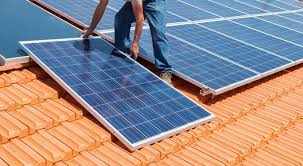
With the cost of energy continuing to climb and concerns about the environmental impact of their homes, more and more homeowners are looking at ways to make their homes greener. Solar panels for a house are one of the best remedies. It eliminates our dependence on fossil fuels and saves us money on our electrical bills. As solar panel technology has improved and as the panels have become cheaper, it’s easier than ever to transform sunlight into energy.
The cells contained in each solar panel go to work converting sunlight to electricity, which eventually flows into the home (or commercial building, or power farm). Such cells soak up photons from the sun and produce a pulsing flow of electricity, which is changed from direct to alternating current using an inverter, making it usable for a house. This enables homeowners to power appliances, lights, electronics, and other home electrical products with electricity generated by residential solar installations.
One of the biggest advantages of using solar technology is the monthly savings on your energy bills. What’s more, depending on where you live and how much electricity you consume, solar panels can reduce or eliminate a sizable chunk of your utility bill. An average 6-kilowatt system, which is typical for residential use, can generate anywhere from about 7,000 to 9,000 kilowatt-hours a year. That output should be enough to cover most, if not all, of a household’s electricity needs. It is sometimes true that savings resulting from reduced energy consumption can offset the purchase price of a residential solar system in just a few years.
Roughly halfway through the process of weighing energy upgrades, I can tell you that solar panels for a house are not just an environmentally friendly option, they’re a smart investment, too. Not only do they cut monthly costs, but they also increase long-term home value. Research has shown that houses with solar energy systems sell for more than houses without them. It has much to do with the greater demand for houses that are energy-efficient, lowering operating costs, and containing sustainable features.
Environmental advantages are another good reason to consider solar. Conventional electricity production is one of the highest sources of carbon-intensive power due to the burning of fossil fuels. Solar panels, by contrast, generate electricity without emitting carbon dioxide or other pollutants. A U.S. Department of Energy and National Renewable Energy Laboratory study estimates that the typical home "going solar" decreases its carbon footprint by three to four tons annually, which roughly equates to planting 100 trees each year.
Although some homeowners may be soothed by the siren song of rebate programs, the initial investment is less daunting than it seems, and there are tons of incentives to help ease the blow. Various government programs, including tax credits or rebates, can reduce the installation price substantially. What’s more, numerous jurisdictions have net-metering options, meaning homeowners can receive credits for any surplus electricity they create and feed to the grid. These considerations accelerate the time to recover one's investment and maximize the long-term value of solar.
Solar systems require little in the way of maintenance. With very few moving parts and materials that can last decades, most panels don’t require much maintenance besides the occasional swipe with a hose to clean off dirt and regular checks to make sure everything is still functioning properly. Most systems also carry warranties for 20 to 25 years, and even those well beyond city limits, panels will likely make electricity at a diminished, though still useful, capacity.
With more homeowners seeking green ways to power their houses, the trend toward renewable energy is picking up steam. Solar panels, as we know, have never been more efficient, cheaper, or better looking than now, and many modern homeowners understand the importance of being green and saving money.
In conclusion
Solar panels for a house are a direct line to energy independence, lower utility bills , and a cleaner future. For people who want to save green while they go green, solar energy is not just a solution that is up to the challenge of today; it is a solution that will continue to keep our planet green for years to come.







Write a comment ...